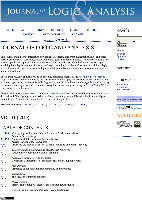
Journal of Logic and Analysis
metrics 2024
Elevating Understanding Through Rigorous Analysis
Introduction
The Journal of Logic and Analysis is an esteemed scholarly periodical dedicated to the fields of logic and mathematical analysis, published by JOURNAL LOGIC & ANALYSIS. This Open Access journal, operational since 2009, provides researchers, professionals, and students with unrestricted access to cutting-edge research and advancements in these critical areas of study. Based in the United States, it has garnered attention for its interdisciplinary approach, contributing significantly to the academic community's understanding of complex logical frameworks and analytical techniques. The journal's recent Scopus rankings indicate its competitive standing within its categories, including Q3 in Analysis and Logic, as well as Modeling and Simulation, showcasing its relevance and impact within these domains. By fostering innovative research and collaboration, The Journal of Logic and Analysis plays a vital role in the advancement of knowledge and scholarship in mathematics and its applications.
Metrics 2024
 0.41
0.41 0.30
0.30 0.60
0.60 5
5Metrics History
Rank 2024
Scopus
IF (Web Of Science)
JCI (Web Of Science)
Quartile History
Similar Journals
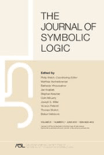
JOURNAL OF SYMBOLIC LOGIC
Unraveling Complexities of Thought Since 1938The JOURNAL OF SYMBOLIC LOGIC, published by Cambridge University Press, stands as a leading platform for scholarly discourse in the realms of logic and philosophy. With a rich history dating back to 1938, this esteemed journal is dedicated to presenting cutting-edge research that pushes the boundaries of knowledge within symbolic logic and its applications. In 2023, it proudly holds a distinguished Q1 ranking in both Logic and Philosophy categories, reflecting its high impact and relevance in the academic community. Researchers and academics benefit from its rigorous peer-review process and contributions from leading scholars worldwide, ensuring the dissemination of high-quality research and critical theories. While the journal currently does not operate under an open access model, it remains a pivotal resource for professionals seeking to deepen their understanding of logical theories and philosophical inquiries. Explore the JOURNAL OF SYMBOLIC LOGIC to engage with scholarly articles that challenge conventional thought and inspire future research.
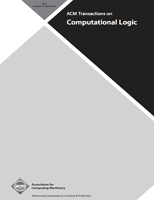
ACM Transactions on Computational Logic
Driving Excellence in Theoretical and Practical LogicACM Transactions on Computational Logic, published by the Association for Computing Machinery, is a premier journal dedicated to the advancement of computational logic, spanning the disciplines of computer science and mathematics. With its ISSN 1529-3785 and E-ISSN 1557-945X, this journal has established itself as a vital resource within the academic community, particularly noted for its influential contributions reflected in its 2023 scopus rankings. The journal holds notable quartile rankings, achieving Q1 in the fields of Computer Science (miscellaneous) and Logic, alongside Q2 in Computational Mathematics and Theoretical Computer Science, indicating its prestigious position in the respective categories. Researchers, practitioners, and students can access a wealth of rigorous research articles that delve into both theoretical frameworks and practical applications of computational logic, fostering innovation and collaboration in the field. As it converges towards its 2024 objectives, ACM Transactions on Computational Logic continues to uphold a commitment to excellence and impact, striving to shape the future of computational theories and methodologies.
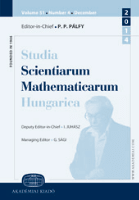
STUDIA SCIENTIARUM MATHEMATICARUM HUNGARICA
Championing Rigorous Research in the Mathematical RealmSTUDIA SCIENTIARUM MATHEMATICARUM HUNGARICA is a distinguished journal published by AKADEMIAI KIADO ZRT, focusing on the vast field of mathematics, specifically categorized under general mathematics. With its ISSN 0081-6906 and E-ISSN 1588-2896, this journal has been a critical platform for mathematicians, researchers, and educators since its inception in 1996, continuously evolving through to 2024. Based in Hungary, it holds an impact factor that positions it in the 3rd quartile for mathematics in the 2023 rankings, reflecting its contribution to academic discourse within the discipline. Though not an open-access journal, STUDIA SCIENTIARUM MATHEMATICARUM HUNGARICA serves as an important repository of innovative research findings and methodologies, making it a vital resource for professionals and students striving to stay ahead in the rapidly advancing world of mathematics. The journal's commitment to quality and rigor enhances its relevance, evidenced by its Scopus rank in the 51st percentile overall in the general mathematics category.

TRANSACTIONS OF THE AMERICAN MATHEMATICAL SOCIETY
Championing Excellence in Mathematical ResearchTRANSACTIONS OF THE AMERICAN MATHEMATICAL SOCIETY, published by the American Mathematical Society, is a premier journal in the field of mathematics that has been contributing to the advancement of mathematical knowledge since 1900. With an ISSN of 0002-9947 and an E-ISSN of 1088-6850, this journal holds a prestigious position in the academic landscape, evidenced by its Q1 rankings in both Applied Mathematics and Miscellaneous Mathematics categories as of 2023. With a Scopus ranking of #97 in General Mathematics and a percentile standing of 75th, the journal is recognized for its rigorous peer-review process and the quality of the research it publishes. Though it does not currently offer open access options, it essentially serves as a vital resource for researchers, professionals, and students seeking critical insights and developments in mathematical theory and applications. The Transactions aim to publish high-quality research articles that foster the exchange and dissemination of ideas, supporting the growth of both theoretical and applied mathematics within the global scholarly community.
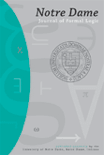
Notre Dame Journal of Formal Logic
Illuminating the Foundations of Logical InquiryNotre Dame Journal of Formal Logic is a premier academic publication dedicated to the advancement of research in the field of logical studies. Published by DUKE UNIVERSITY PRESS, this journal has been a significant contributor to the discipline since its inception in 1960, with an impressive convergence of scholarly articles expected to continue through 2024. With its focus on rigorous formal logic, the journal plays a crucial role in fostering discussions that bridge mathematics and philosophical inquiry, holding a notable Q2 ranking in the 2023 Logic category. Despite its non-open-access status, the journal reaches a wide audience of researchers, professionals, and students committed to exploring the foundational aspects of logics. Located in Durham, NC, it provides a platform for innovative thought and critical engagement within the logic community. With its impactful contributions, the Notre Dame Journal of Formal Logic stands as a vital resource for those seeking to deepen their understanding of both classic and contemporary logical theories.

Journal of Logic Language and Information
Fostering Critical Discourse in Language and Information TheoryThe Journal of Logic Language and Information, published by SPRINGER, stands as a leading interdisciplinary platform dedicated to the exploration of the interconnections between logic, language, and information theory. With a history spanning from 1992 to 2024, this esteemed journal provides a vital forum for researchers, professionals, and students in fields such as Computer Science, Linguistics, and Philosophy. Notably recognized in the 2023 rankings, it holds a Q2 quartile in Computer Science (miscellaneous) and Q1 quartiles in both Linguistics and Language, and Philosophy, reflecting its high academic quality and relevance. Despite its nuanced focus, the journal's diverse scope attracts a global readership, encouraging innovative research and critical discourse. Although it is not an Open Access publication, the Journal's valuable contributions can be accessed through various institutional subscriptions, ensuring that its scholarly output remains influential within the academic community.

Filomat
Exploring Complex Concepts for Academic ExcellenceFilomat is a distinguished academic journal published by the University of Niš, Faculty of Science and Mathematics, located in Serbia. Operating since 2010, the journal has carved a niche within the field of mathematics, particularly in miscellaneous mathematics, as evidenced by its recognition in the Q3 quartile for 2023. With an ISSN of 0354-5180, Filomat provides a platform for both researchers and academics to share insights and advancements across diverse mathematical disciplines, enhancing collaboration and knowledge sharing. Although the journal currently does not offer open access, its contributions are critical for those engaging with complex mathematical concepts and applications. Furthermore, with a Scopus rank of #223 out of 399 in the realm of General Mathematics, it stands as a credible source for high-quality research. The journal's objective is to promote a deeper understanding and application of mathematical theories, making it a vital resource for students, professionals, and researchers alike.

Moscow University Mathematics Bulletin
Fostering Innovation in Mathematical ResearchMoscow University Mathematics Bulletin is a distinguished academic journal published by Springer International Publishing AG, focusing on the dynamic field of mathematics. With an ISSN of 0027-1322 and an E-ISSN of 1934-8444, this journal serves as a platform for innovative research and developments in various mathematics sub-disciplines, making significant contributions to both theoretical and applied mathematics. While it holds a Q3 ranking in the field of Mathematics (miscellaneous) for 2023, this journal remains dedicated to fostering academic discourse among mathematicians. Researchers, professionals, and students will find value in the diverse range of articles that embody rigor and creativity. Although currently not an Open Access publication, the journal provides numerous access options through institutional or personal subscriptions. From its inception in 2007 to its expected continuity until 2024, the Moscow University Mathematics Bulletin is committed to enhancing the understanding and appreciation of mathematical sciences.
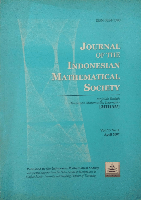
Journal of the Indonesian Mathematical Society
Advancing Mathematical Knowledge, One Paper at a Time.Journal of the Indonesian Mathematical Society is an esteemed platform that serves as a vital conduit for the dissemination of research in various domains of mathematics. Published by the Indonesian Mathematical Society, this journal prioritizes fostering mathematical knowledge and innovation among scholars both regionally and globally. While it currently holds a Q4 ranking in the field of Mathematics (miscellaneous) and ranks within the lower percentile on Scopus, it actively encourages contributions from mathematicians that push the boundaries of current research trends. The journal, accessible at imsi.org/journal, emphasizes open access to ensure that findings reach a wider audience, thereby enhancing their impact. Located in Bandung, Indonesia, and set to converge its publication years from 2019 to 2024, it stands as an important venue for researchers, professionals, and students engaged in mathematical inquiry and advancement.

Facta Universitatis-Series Mathematics and Informatics
Exploring Frontiers: Mathematics and Informatics in Global DiscourseFacta Universitatis-Series Mathematics and Informatics is a prestigious interdisciplinary journal published by UNIV NIS that emphasizes the integration of mathematical theories and computational methods essential for advancements in various scientific fields. With the ISSN 0352-9665 and E-ISSN 2406-047X, this journal serves as a vital platform for researchers and professionals to disseminate cutting-edge findings related to mathematics and informatics. As an open-access journal, it aims to enhance the visibility and accessibility of high-quality research, fostering collaboration among scholars globally. The journal's commitment to excellence is evident in its rigorous peer-review process, which ensures that only the most impactful and innovative research papers are published. Set against the backdrop of its esteemed Serbian institution, Facta Universitatis not only aims to contribute to the global academic discourse but also to inspire the next generation of mathematicians and computer scientists. As the field continues to evolve, this journal plays a crucial role in shaping the future landscape of mathematics and informatics.